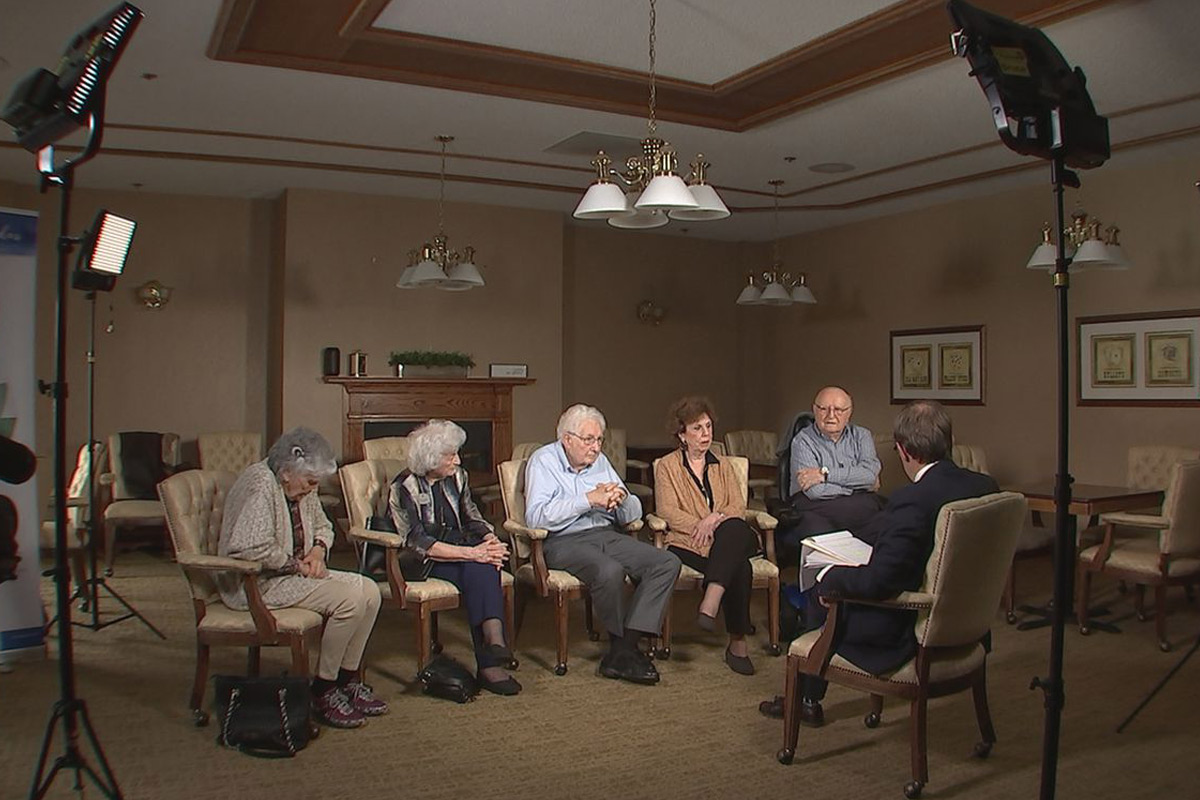‘I was there, I saw it happen’: Charlotte Holocaust survivors hope others never forget
Monday marks 75 years since the Soviet Union liberated the Auschwitz concentration camp in German-occupied Poland at the end of World War II, and is now observed as International Holocaust Remembrance Day.

By: Mark Becker
CHARLOTTE, N.C. — Eyewitness News reporter Mark Becker spoke with five survivors who now call Charlotte home. They said they will always remember the Holocaust and how they left it behind.
“You know, these memories that come back, it’s torture — torture,” Felix Pierson told Channel 9 at a retirement community in south Charlotte. “Somehow, when we get older, all these happenings from the past keep coming back more than ever before.”
The survivors want to make sure no one forgets about the Holocaust.
“I remember being scared,” Suly Chenkin said. “I remember how my parents sent me away to people they had never met — tossed me over barbed wire.”
She was tossed over the fence in a sack, so she had a chance to live. Chenkin was 3 years old when the Nazis raided a ghetto in Lithuania, where she was living with her parents. The oppressors began rounding up children younger than 12.
“I was hidden in a bunker and survived that raid, but my parents knew that they had run out of time and that’s why they made that horrible decision and sent me away,” Chenkin said. “I was lucky, a woman who was Jewish herself, passing for Christian, saved my life.”
“I am the luckiest of survivors that I have ever met in my life,” Daisy Shapiro-Rieke told Channel 9. She was born in Austria and a year later in 1937, her family moved to Hungary, which was also under Nazi control.
They survived because Daisy’s mother was able to buy falsified papers and somehow found the courage to stand up to the soldiers.
“The Nazis would come to our door and say, ‘There are Jewish people here, a truck is waiting,’” Shapiro-Rieke said. “My mother pulled out the falsified documents and said, ‘Yes, my husband is a Jew. He’s in prison, but I am Catholic and so are both of my children.’ And she showed them the falsified documents.”
Irving Bienstock was 12 years old living in Dortmund, Germany when Kristallnacht happened, which was when Nazis targeted the Jewish community in Germany.
Kristallnacht, also known as the “Night of Broken Glass,” took place on Nov. 9, 1938.
“Around the middle of the night I was sleeping, and I heard a loud noise in the street,” Bienstock said.
Mobs of Nazis gathered and went from one Jewish home to the next.
“And I got up and looked out from behind the curtain, and I could see the synagogue down the block was burning and there were mobs of people on the street yelling, which meant, ‘Out with the Jews, exterminate them.’ I was scared to death,” he said.
Hanna Adler said, “We looked out, and I saw one of my high school teachers, and they screamed for my father to come out.”
Adler was in a small town 25 miles away, where the mob rounded up her father and the other Jewish men.
“And they did terrible things to them,” Adler said. “We could hear the screaming. What they were doing to them? They threw one man from his roof and then they kept saying, ‘Throw the women, too!’ They didn’t do that.”
Her father was beaten badly but somehow survived. Bienstock’s family lived through the terror, too, before leaving Germany.
Pierson wasn’t so lucky.
“Life in Poland was living under anti-Semitism from the day I was born,” Pierson said.
He was 13 years old living in a small town in Poland when the Germans invaded. The horror of war and hate became clear when the Nazis arrested two teenagers he knew for stealing potatoes.
“There was an announcement: ‘The entire town has to come out to the Jewish cemetery to see these two boys hung,’” Pierson said. “And at the age of 13, seeing my friends’ brothers hung, it takes the soul out of you. It takes everything you got in you. It takes everything out.”
In 1944, he was rounded up with the town’s other 3,000 Jews and sent to a concentration camp near Dachau, Germany. He said he was half-dead when U.S. troops finally arrived in 1945.
“In Dachau, there were hundreds of corpses lying on the ground,” Pierson said. He is convinced he survived because of the love and courage of his father.
Chenkin said, “And here, we all have told stories about what our parents did to save us.”
“We survived because someone was very brave and did something that worked, but unfortunately, the whole world stood by and let it happen,” Beinstock said.
The survivors told Channel 9 they will continue to share their stories as long as they can.
“There will come a time when someone will come and say, ‘This never happened,’” Peirson said. “I was there. I saw it happen.”
